Waste not, want not: the rise of discarded spirits
Worldwide, edible food is being thrown away in huge amounts, but spirits brands are taking waste produce and creating impressive drinks.
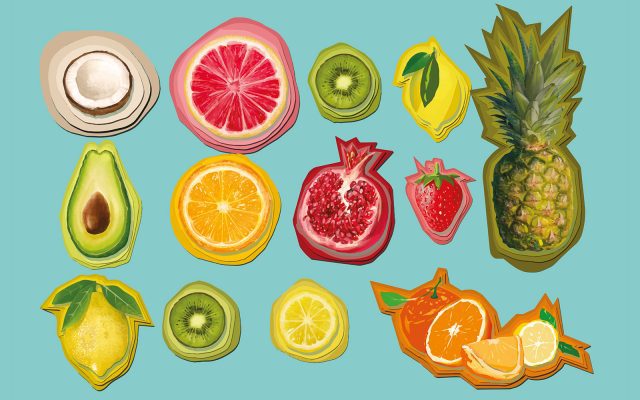
*This feature was originally published in the July 2024 issue of The Spirits Business magazine.
When it comes to food waste, the figures are startling. According to the Food Waste Index Report 2024, co-authored by the UN Environment Programme and the charity WRAP (Waste and Resources Action Programme), 1.05 billion tonnes of food went to waste worldwide in 2022 – nearly one-fifth of the total food available to consumers. This waste has serious implications for world hunger, accounts for 8%-10% of global greenhouse gas emissions, and takes up the equivalent of about 30% of all agricultural land.
To meet the UN’s goal of halving global food waste per capita by 2030, the report emphasises the need for “collaborative and concerted efforts” in supply chains and sectors. In the spirits industry, a growing number of businesses are answering this call to action, using ingredients that would otherwise be discarded to craft eaux-de-vie, vodka, whisky, and more. By taking a creative approach to their raw materials, spirits brands are demonstrating the potential of ‘wonky’ produce and other so-called ‘waste’.
This idea is at the heart of Greensand Ridge Distillery in Kent, UK, which makes a range of spirits with surplus produce sourced from local farms. “For the sustainability of our food system in general, we need to use less agricultural land and produce more food for people,” says Will Edge, who founded Greensand Ridge in 2015. “Really, the main way of being able to achieve that very cost effectively is to reduce food waste.”
When the blackcurrant farmers who work with Ribena have an oversupply of crop, Edge takes the surplus off their hands to make his Blackcurrant Ghost. He produces a mango eau-de-vie using fruit recovered from supermarket packhouses, works with growers to repurpose their excess plums and apples into brandies, and is currently ageing a wheat whisky made from the waste pancake trimmings. “The farmers and the food producers that I work with really care about the land and their stewardship of the land. A lot of the time when food-waste issues come up, it falls to the farmers to shoulder the cost,” Edge explains. “When we can make great spirits from the surplus produce, as I hope I’ve been able to prove over the years, it seems obvious to me.”
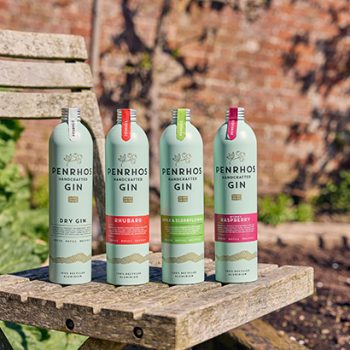 Rescuing ‘wonky’ fruit is also the motivation behind Penrhos Spirits, in Herefordshire, UK. The brand’s founders, who are farmers, became frustrated with the amount of fruit waste they had, and decided to produce gin with the unsaleable crop. They now make several gins containing surplus produce, including a Wonky Raspberry Gin, and salvage fruit from neighbouring farms as well.
Rescuing ‘wonky’ fruit is also the motivation behind Penrhos Spirits, in Herefordshire, UK. The brand’s founders, who are farmers, became frustrated with the amount of fruit waste they had, and decided to produce gin with the unsaleable crop. They now make several gins containing surplus produce, including a Wonky Raspberry Gin, and salvage fruit from neighbouring farms as well.
“Before wonky fruit became a thing, we would have to literally just dispose of waste because there was nowhere for it to go,” says Harriet Williams, head of sales at Penrhos. “Now we’ve massively scaled down the farming side of things, we can actually go and help other farmers.”
Get creative with waste
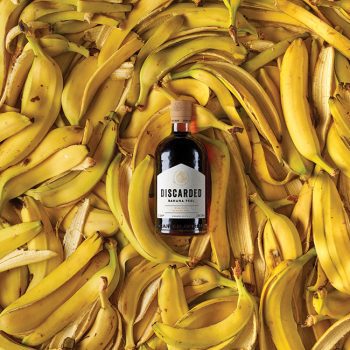 Another brand focused on tackling waste is William Grant & Sons-owned Discarded Spirits, a range of three products that each feature a discarded base liquid and a discarded flavour. The base for the brand’s Banana Peel Rum, for instance, is a rum blend first used to season the casks for The Balvenie Caribbean Cask 14 Year Old; the spirit is then flavoured with an extract made from banana peels, which are by-products of the flavour industry. “We want to communicate to the consumer what you can do when you start to look at waste differently, when you start to get creative with it,” says Sam Trevethyen, global brand ambassador for Discarded.
Another brand focused on tackling waste is William Grant & Sons-owned Discarded Spirits, a range of three products that each feature a discarded base liquid and a discarded flavour. The base for the brand’s Banana Peel Rum, for instance, is a rum blend first used to season the casks for The Balvenie Caribbean Cask 14 Year Old; the spirit is then flavoured with an extract made from banana peels, which are by-products of the flavour industry. “We want to communicate to the consumer what you can do when you start to look at waste differently, when you start to get creative with it,” says Sam Trevethyen, global brand ambassador for Discarded.
For Richard Hochfeld, one of the UK’s biggest fruit importers, working with a spirits brand was a strategic approach to reducing waste within the business itself. In 2019, the company partnered with Foxhole Spirits to produce Hyke Gin, made with surplus table grapes; at the end of 2022, Richard Hochfeld became the full owner of Foxhole Spirits.
“For us, it’s about stopping fruit from going in the bin when so much resource has been used to make that fruit,” says Simon Pierce, commercial account manager at Hyke Gin.
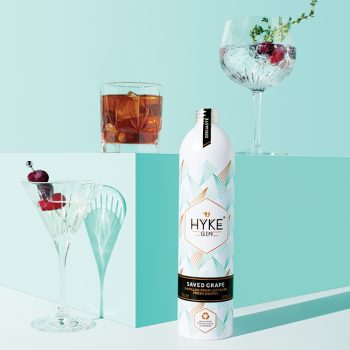 The team has been at work updating Hyke’s brand strategy this year, switching to 100% recycled aluminium bottles to ensure that its packaging aligns with its environmentally conscious ethos.
The team has been at work updating Hyke’s brand strategy this year, switching to 100% recycled aluminium bottles to ensure that its packaging aligns with its environmentally conscious ethos.
Hayman’s Distillers in London also saw the opportunity to cut its waste levels by creating a new brand. In 2022, the business launched Respirited, a vodka created by re-distilling its own surplus grain spirit.
“Respirited encapsulates our ‘reduce waste’ mission and the goals we want to achieve by taking a 360˚ approach,” says co-owner Miranda Hayman. “Our sustainable loop demonstrates how we can minimise the waste we throw away by keeping the product in the chain of use.”
But producing spirits from surplus or waste materials comes with a distinct set of challenges, too. According to Trevethyen, common production issues are “compounded” when working with waste ingredients. “We’re not getting a product that we have selected, processed and got it to be exactly how we want it,” he says. “We’re fundamentally getting something that someone didn’t need anymore, which also adds consistency issues.” To combat this, Discarded now buys larger batches of ingredients, which also helps to cut down on transport costs.
Labour intensive
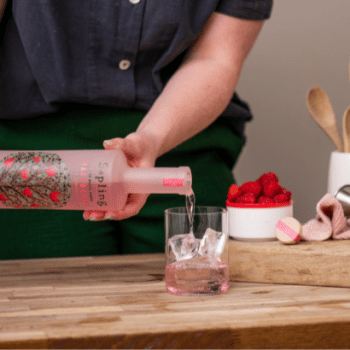
For English brand Sapling Spirits, one significant hurdle is sourcing. “It’s more labour intensive because you have to source the [wonky fruits] as and when they are surplus, so there isn’t a steady and regular supply chain,” says co-founder Ivo Devereux. To make its Raspberry & Hibiscus Vodka, which uses raspberries that would otherwise be thrown away, Sapling produces its volumes in one or two runs rather than throughout the year.
Establishing a supply chain has also presented challenges for California’s Wheyward Spirits, made from whey left over from the cheesemaking process. “I’m an upcycler,” says founder Emily Darchuk, who has also worked as a food scientist. “Essentially, that’s taking materials and trying to bridge gaps to prevent food waste from happening,” she says. “A lot of dairy farmers are dealing with whey however is cheapest within their means. But if they can tanker it out to get rid of it, I can tanker it out to use it.”
In some cases, she collaborates with suppliers to improve their infrastructure so Wheyward can use their whey. “Having those conversations, figuring out those logistics, building that as an individual in a way that I was actually making an impact, and then also having that pathway to be able to scale – that was some upstream work.” Through these efforts, Wheyward has developed a relationship with the California Milk Advisory Board, and is the first and only spirits producer permitted to carry the organisation’s seal on its labels.
Consumer perception is another obstacle for brands working with surplus ingredients. Though the idea of repurposing wonky fruit is gaining traction, brands working with waste still have to grapple with the “false conceit of rubbish in, rubbish out”, says Edge. “Part of it is the industry itself communicating to users that to make a good spirit, you need to till the land with the finest grain and only pluck the finest fruit from the tree,” he explains. “But we’re not talking about sweeping up off the factory floor. We’re talking about oversized, misshapen, too-much produce.”
As a result of such perceptions, the team at Discarded have revamped their approach to marketing. “We used to lead with ‘made from waste’ a lot more,” says Trevethyen. “But particularly as you get closer to liquids or cocktails, the research we did showed consumers didn’t like that, and you really struggle to play in a premium space.” Discarded now prioritises messaging around the ‘flavour-forward’ qualities of its range instead, and discussion of recycled ingredients plays a supporting role.
Darchuk is hopeful that ideas about waste are shifting. “It’s been cool to see consumer acceptance. When I was talking about this five, seven years ago, people looked at me like I was nuts,” she remembers. “From that education standpoint, it’s caught up a lot. That’s going to pay dividends in the long run for the food system as a whole.”
Transparency is a major issue in sustainability marketing , and that holds true for spirits made with surplus materials. “There are a lot of businesses calling themselves carbon negative, or climate positive, but that have very carbon-intense business production methods and are just using cheap offsets,” says Edge. He is in the process of updating his labels to disclose the number of grams of CO2e and the percentage he’s offsetting per bottle.
Although more producers are embracing the use of surplus ingredients, there is still plenty of untapped potential for the trade to contribute to the reduction of food waste. Edge believes that the real opportunity lies with the large manufacturers of neutral grain spirits. “Where we’re really going to make a difference is if the big producers start to use surplus grains and breads and wheats,” he says. “Then all the markets they serve will automatically be using surplus produce.”
Has your brand formed any partnerships to advance sustainability efforts in the spirits sector?
Anna Schreil – vice-president, operations, Absolut
“Absolut’s collaboration with Ardagh Glass Packaging represents a major advancement in sustainability in the spirits industry. We’ve been partners with Ardagh for the last 40 years; our bottles are made at Ardagh’s glass manufacturing plant in Limmared, Sweden. In 2022 we announced that together we would transition to a partly hydrogen-fired furnace for the production of our glass bottles. This move will reduce CO2 emissions by around 20%, and we are close to seeing the furnace in operation later this year. This pioneering effort not only sets a global precedent but also aligns with our goal of achieving a carbon-neutral product by 2030. ”
Katie Smith – global brand manager, communications, The Botanist
“We’ve been sponsoring the Global Botanic Garden Fund run by Botanic Gardens Conservation International (BGCI) since 2020. The fund offers small grants to gardens working to prevent the extinction of plants. Through the fund, The Botanist has supported seed banks, field research and restoration in Hawaii, South Africa, and India, among others. In 2021, we released The Plant Conservation Edition to further support this cause. The limited edition featured bespoke packaging that highlighted our partnership along with a plant tag gift with purchase. The partnership enabled us to donate further funds to BGCI so that they can continue to support gardens who are at the frontline of saving plant species before they disappear.”
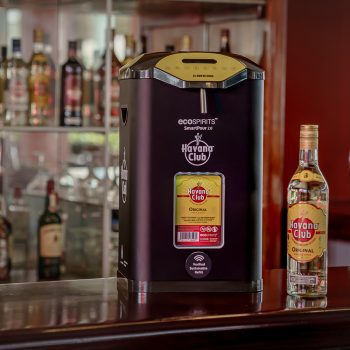 Marie Benech – communications, public affairs and CSR director, Havana Club
Marie Benech – communications, public affairs and CSR director, Havana Club
“We recently partnered with EcoSpirits to revolutionise our production and distribution methods in Cuba. This collaboration introduced the EcoPlant at our San José distillery, which cleans, sanitises and refills EcoTotes – 4.5-litre reusable containers – of our Havana Club Original – Añejo 3 Años, significantly reducing bottle imports and glass waste. This year, we launched our mangroves restoration project in partnership with Cuba’s Instituto de Geografía Tropical, collaborating with local authorities and training the community to rebuild sustainable tourism and protect coastal areas where our communities reside, saving 17,000 tons of CO2 annually.”
Imogen Armstrong – sustainable operations director, Secret Garden Distillery
“We constantly look to collaborate with people who have a similar keen interest in sustainability so we can continuously learn and improve our efforts. Verallia UK, a key partner, exemplifies this by using 70% recycled materials in their standard flint glass, while also minimising our emissions from the transport of goods with a UK-based manufacturing plant. Another vital partner, Net Zero Nation, offers invaluable support in measuring our Scope 1, 2, and 3 emissions, aiding the distillery in creating our first carbon accounts and maintaining that transparency through annual reporting. Evaluating our impact is the first step to implementing effective change in our business.”
Mauricio Solórzano – senior brand ambassador, Flor de Caña
“Over the years, we’ve partnered with organisations and individuals that share our values and our passion for sustainability, to join forces, and to have a broader and more meaningful impact on people and the planet. We work alongside the Sustainable Restaurant Association to help educate and promote eco-friendly practices in the hospitality industry. One Tree Planted has also been a valuable partner to promote reforestation efforts globally. Thanks to their support we’ve planted one million trees since 2005.”
María Fernanda Frausto Romero – marketing executive, Grupo Solave
“We have generated alliances as a distillery with our customers to produce adobe bricks that can be used in construction projects; today, we have benefited communities in Jalisco, Mexico in the construction of 10 houses. These adobe bricks are made with clay and sand from the Amatitán region, agave bagasse, vinasse, and biomass ashes, the latter three being remnants of our production.”
Tanya Clarke – CEO, The Lost Explorer Mezcal
“We are always curious about exploring new, more sustainable approaches and we learn through collaboration. The Pavisa Group is our bottle supplier in Mexico, and uses recycled glass (up to 55% in each of our bottles) to reduce glass waste and energy use at its factory. The wax seal on our bottles is created with ALB, a socially responsible company, that support cooperatives of indigenous women from Oaxaca and ensure they receive a fair price and treatment for their produce. Lastly, we create waste agave copitas – traditional drinking vessels – from our agave fibres (‘bagazzo’), which is the residual product from mezcal production.”
Damola Timeyin – co-founder, Spearhead Spirits
“Sustainability is baked into the production of Bayab gin, which is powered by the African sun and produced in our fully solar-powered distillery. All of our raw materials are procured from sustainable, environmentally and organic sources. We have partnered with Ho Technical University, Ghana, to preserve Africa’s baobab tree, which is central to Bayab’s story. This project aims to accelerate the baobab tree’s growth process, improve the cultivation of the tree and ultimately protect baobabs from the eradication they face as the baobab fruit grows in popularity. Their pioneering research will lead to us planting a million baobab trees in 10 years.”
Related news
Cocktail stories: Speed Bump, Byrdi
